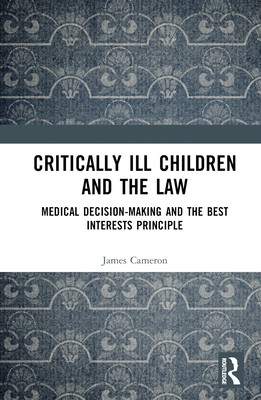
- We will send in 10–14 business days.
- Author: James Cameron
- Publisher: Routledge
- ISBN-10: 1032537477
- ISBN-13: 9781032537474
- Format: 15.6 x 23.4 x 1.6 cm, kieti viršeliai
- Language: English
- SAVE -10% with code: EXTRA
Reviews
Description
A series of recent high-profile court cases has demonstrated the inadequacy of current laws in addressing issues relating to medical treatment decisions involving seriously ill children. The challenges of determining that life-sustaining medical treatment is not in a young child's best interests have resulted in criticism of the best interests principle. This book explores the theoretical foundations of the best interests principle, and alternatives offered in the academic literature, to allow readers to understand why the principle remains contentious despite its prevalence. It provides theoretical background, exploration of what occurs in practice, and proposes a novel approach to address these challenges. Frameworks for decision-making identified in the academic literature are used to examine the application of the best interests principle in practice in England and Wales, Australia, and New Zealand through a review of the case law and qualitative research with paediatric doctors. The exploration of current practice allows readers to understand the challenges of applying the best interests principle, but also the need to retain a focus on the child. Readers are introduced to a human-rights based approach, which ensures that the focus remains on upholding the child's best interests but also provides a more comprehensive explanation of the situation. Progressing the debate around end-of-life decision-making and children, the book will be a valuable resource for academics, researchers and policy-makers. It will also provide practical guidance to both legal and medical practitioners in managing disputes about the provision of life-sustaining treatment.
EXTRA 10 % discount with code: EXTRA
The promotion ends in 23d.15:50:08
The discount code is valid when purchasing from 10 €. Discounts do not stack.
- Author: James Cameron
- Publisher: Routledge
- ISBN-10: 1032537477
- ISBN-13: 9781032537474
- Format: 15.6 x 23.4 x 1.6 cm, kieti viršeliai
- Language: English English
A series of recent high-profile court cases has demonstrated the inadequacy of current laws in addressing issues relating to medical treatment decisions involving seriously ill children. The challenges of determining that life-sustaining medical treatment is not in a young child's best interests have resulted in criticism of the best interests principle. This book explores the theoretical foundations of the best interests principle, and alternatives offered in the academic literature, to allow readers to understand why the principle remains contentious despite its prevalence. It provides theoretical background, exploration of what occurs in practice, and proposes a novel approach to address these challenges. Frameworks for decision-making identified in the academic literature are used to examine the application of the best interests principle in practice in England and Wales, Australia, and New Zealand through a review of the case law and qualitative research with paediatric doctors. The exploration of current practice allows readers to understand the challenges of applying the best interests principle, but also the need to retain a focus on the child. Readers are introduced to a human-rights based approach, which ensures that the focus remains on upholding the child's best interests but also provides a more comprehensive explanation of the situation. Progressing the debate around end-of-life decision-making and children, the book will be a valuable resource for academics, researchers and policy-makers. It will also provide practical guidance to both legal and medical practitioners in managing disputes about the provision of life-sustaining treatment.


Reviews